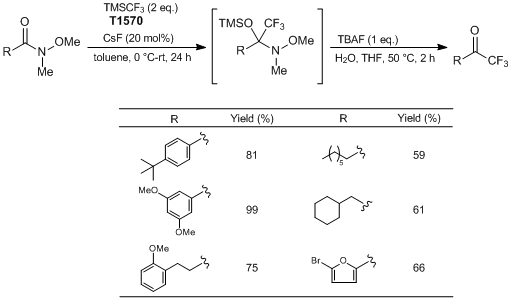Maximum quantity allowed is 999
Please select the quantity
CAS RN: 81290-20-2 | Product Number: T1570
(Trifluoromethyl)trimethylsilane [Trifluoromethylating Reagent]
Purity: >97.0%(GC)
Synonyms:
- (Trimethylsilyl)trifluoromethane
- Ruppert-Prakash Reagent
Product Documents:
| Size | Unit Price | Shanghai | Tianjin | Japan* |
|---|---|---|---|---|
| 1G |
¥130.00
|
6 | Contact Us | Contact Us |
| 5G |
¥410.00
|
15 | Contact Us | ≥60 |
| 25G |
¥950.00
|
≥40 | Contact Us | ≥100 |
* For order or inquiry, please contact
Our Authorized Distributors.
*TCI frequently reviews storage conditions to optimize them. Please note that the latest information on the storage temperature for the products is described on our website.
* To send your quote request for bulk quantities, please click on the "Request Bulk Quote" button. Please note that we cannot offer bulk quantities for some products.
| Product Number | T1570 |
| Purity / Analysis Method | >97.0%(GC) |
| Molecular Formula / Molecular Weight | C4H9F3Si = 142.20 |
| Physical State (20 deg.C) | Liquid |
| Storage Temperature | Room Temperature (Recommended in a cool and dark place, <15°C) |
| Store Under Inert Gas | Store under inert gas |
| Condition to Avoid | Moisture Sensitive |
| CAS RN | 81290-20-2 |
| Reaxys Registry Number | 4241868 |
| PubChem Substance ID | 87577328 |
| SDBS (AIST Spectral DB) | 19694 |
| Merck Index (14) | 9683 |
| MDL Number | MFCD00145454 |
Articles/Brochures
Product Documents (Note: Some products will not have analytical charts available.)
Safety Data Sheet (SDS)
Please select Language.
The requested SDS is not available.
Please Contact Us for more information.
Specifications
C of A & Other Certificates
Please enter Lot Number
Incorrect Lot Number. Please input only the 4-5 alphanumeric characters before the hyphen.
Sample C of A
This is a sample C of A and may not represent a recently manufactured lot of the product.
A sample C of A for this product is not available at this time.
Analytical Charts
Please enter Lot Number
Incorrect Lot Number. Please input only the 4-5 alphanumeric characters before the hyphen.
The requested analytical chart is not available. Sorry for the inconvenience.
![(Trifluoromethyl)trimethylsilane [Trifluoromethylating Reagent] No-Image](/medias/T1570.jpg?context=bWFzdGVyfHJvb3R8NzU0MTB8aW1hZ2UvanBlZ3xhRGRsTDJoaVpTODRPVEl6TkRFM05qY3pOelU0TDFReE5UY3dMbXB3Wnd8YjdiMmNiNWZiODExMzE5ZDE3Mzg5MDVmNDYwOGIzYTM1OGQxYzY1YWZhZTlkNTg3OTczMmI0MmY2YzhhNTQzZg)

![(Trifluoromethyl)trimethylsilane [Trifluoromethylating Reagent] (Trifluoromethyl)trimethylsilane [Trifluoromethylating Reagent]](/_ui/responsive/theme-tci/images/missing_product_zoom.jpg)





